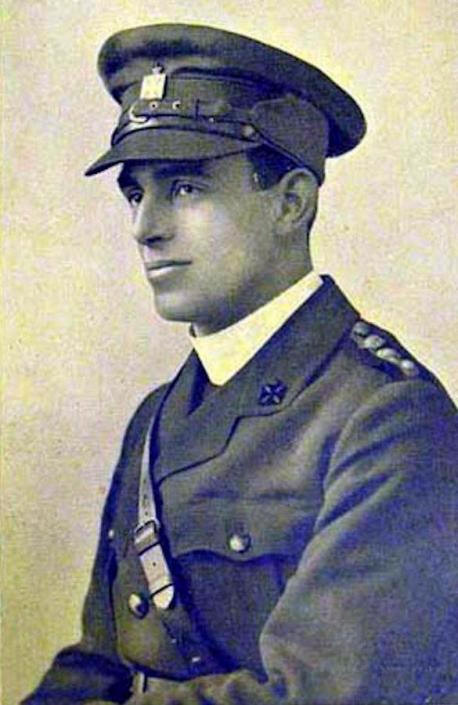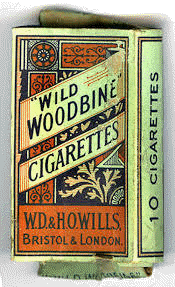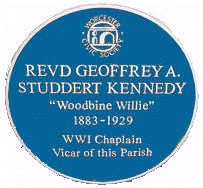 For
those of us who are somewhat long in the tooth, the name Woodbine Willie might
ring a bell somewhere deep within the memory. If pushed we might say he had
something to do with the war but not sure which one and as to the Woodbine
connection, he had something to do with that once famous cigarette. We would be
correct; he was connected with the war, World War I in fact, and yes, he smoked
Woodbines. However there was a great deal more to him than that!
For
those of us who are somewhat long in the tooth, the name Woodbine Willie might
ring a bell somewhere deep within the memory. If pushed we might say he had
something to do with the war but not sure which one and as to the Woodbine
connection, he had something to do with that once famous cigarette. We would be
correct; he was connected with the war, World War I in fact, and yes, he smoked
Woodbines. However there was a great deal more to him than that!
He was born Geoffrey Studdert Kennedy, the seventh of nine children to the
Rev William Studdert Kennedy and his wife Jeanette on 27th June 1883.
His father was the vicar of St Mary’s church, Quarry Hill in Leeds. He was
educated at Leeds Grammar School
and studied classics and
divinity at Trinity College, Dublin, graduating in 1904. He went on to Ripon
Clergy College, became a curate in Rugby and in 1914 he became vicar of St
Paul’s church in Worcester.
On the outbreak of World War I, aged 31, he volunteered as an army chaplain
and was attached to a bayonet- training service. He toured the western front
with a group of boxers and wrestlers giving enthusiastic morale boosting
speeches about the use
 of the weapon. He saw his ministry as being in the thick
of the fighting and that is where he went. He would go into no-mans-land to give
help and comfort, a copy of the New Testament and of course a Woodbine to
wounded and dying men with little thought for his own safety. In 1917 he was
awarded the Military Cross at Messines Ridge. There is a story of how he once
crawled out to a where a working party was putting up wire in front of their
trench. When challenged by a nervous soldier who asked who he was, he said, "The
church". The soldier then asked what the church was doing out in no-mans-land,
his reply was, "Its job". He was popular with his flock for his irreverent
preaching style and somewhat colourful language. He described his ministry as
"taking a box of fags in your haversack and a great deal of love in your heart".
of the weapon. He saw his ministry as being in the thick
of the fighting and that is where he went. He would go into no-mans-land to give
help and comfort, a copy of the New Testament and of course a Woodbine to
wounded and dying men with little thought for his own safety. In 1917 he was
awarded the Military Cross at Messines Ridge. There is a story of how he once
crawled out to a where a working party was putting up wire in front of their
trench. When challenged by a nervous soldier who asked who he was, he said, "The
church". The soldier then asked what the church was doing out in no-mans-land,
his reply was, "Its job". He was popular with his flock for his irreverent
preaching style and somewhat colourful language. He described his ministry as
"taking a box of fags in your haversack and a great deal of love in your heart".
After the war, he became one of the country’s most famous
religious authors, writing poems about his war experiences as well as books
about the Church and society. The enthusiastic bayonet expert had become a
pacifist and Christian Socialist and he toured the country giving lectures on
both these topics. He died on 8th March in 1929 on one of these tours in Liverpool. At his funeral procession in
Worcester a crowd of more than 2,000 turned out and packets of Woodbines in
their distinctive green, black and gold were tossed onto his cortege.
March in 1929 on one of these tours in Liverpool. At his funeral procession in
Worcester a crowd of more than 2,000 turned out and packets of Woodbines in
their distinctive green, black and gold were tossed onto his cortege.
He is buried at St John’s cemetery in Worcester and there
is a list of his achievements on the war memorial in his church. His love of his
fellow man and his incredible courage are not mentioned, neither are his
Woodbines!
In February 2013, the Civic Society of the city where he
had trained for the church unveiled a plaque in his memory at the site of the
Ripon Clergy College in Princess Road. This was the second such plaque because
they had previously erected one in honour of another World War poet who had
trained in Ripon, Wilfred Owen.
Barbara Hothersall
 For
those of us who are somewhat long in the tooth, the name Woodbine Willie might
ring a bell somewhere deep within the memory. If pushed we might say he had
something to do with the war but not sure which one and as to the Woodbine
connection, he had something to do with that once famous cigarette. We would be
correct; he was connected with the war, World War I in fact, and yes, he smoked
Woodbines. However there was a great deal more to him than that!
For
those of us who are somewhat long in the tooth, the name Woodbine Willie might
ring a bell somewhere deep within the memory. If pushed we might say he had
something to do with the war but not sure which one and as to the Woodbine
connection, he had something to do with that once famous cigarette. We would be
correct; he was connected with the war, World War I in fact, and yes, he smoked
Woodbines. However there was a great deal more to him than that! of the weapon. He saw his ministry as being in the thick
of the fighting and that is where he went. He would go into no-mans-land to give
help and comfort, a copy of the New Testament and of course a Woodbine to
wounded and dying men with little thought for his own safety. In 1917 he was
awarded the Military Cross at Messines Ridge. There is a story of how he once
crawled out to a where a working party was putting up wire in front of their
trench. When challenged by a nervous soldier who asked who he was, he said, "The
church". The soldier then asked what the church was doing out in no-mans-land,
his reply was, "Its job". He was popular with his flock for his irreverent
preaching style and somewhat colourful language. He described his ministry as
"taking a box of fags in your haversack and a great deal of love in your heart".
of the weapon. He saw his ministry as being in the thick
of the fighting and that is where he went. He would go into no-mans-land to give
help and comfort, a copy of the New Testament and of course a Woodbine to
wounded and dying men with little thought for his own safety. In 1917 he was
awarded the Military Cross at Messines Ridge. There is a story of how he once
crawled out to a where a working party was putting up wire in front of their
trench. When challenged by a nervous soldier who asked who he was, he said, "The
church". The soldier then asked what the church was doing out in no-mans-land,
his reply was, "Its job". He was popular with his flock for his irreverent
preaching style and somewhat colourful language. He described his ministry as
"taking a box of fags in your haversack and a great deal of love in your heart". March in 1929 on one of these tours in Liverpool. At his funeral procession in
Worcester a crowd of more than 2,000 turned out and packets of Woodbines in
their distinctive green, black and gold were tossed onto his cortege.
March in 1929 on one of these tours in Liverpool. At his funeral procession in
Worcester a crowd of more than 2,000 turned out and packets of Woodbines in
their distinctive green, black and gold were tossed onto his cortege.